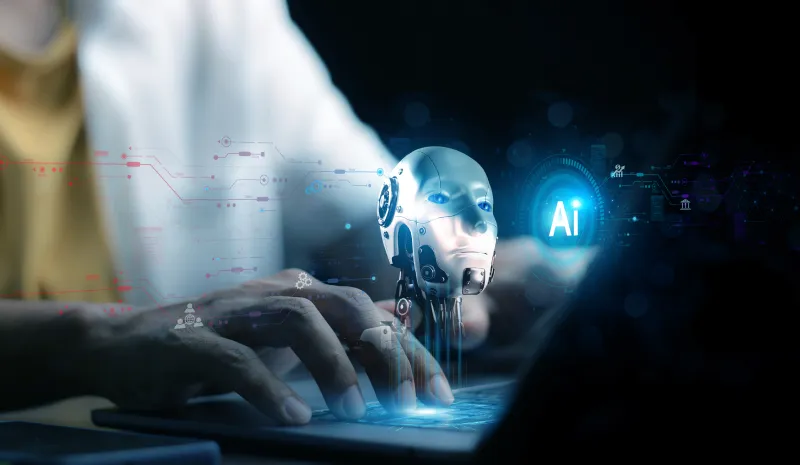What Are Adaptive AI Development Services and How Do They Work?
 Alias Ceasar
Alias CeasarArtificial Intelligence (AI) has rapidly evolved from static rule-based systems to dynamic, learning-capable models. One of the most exciting advancements in this space is Adaptive AI — a new frontier that allows systems to learn continuously, adapt to changing environments, and improve over time.

But what exactly are Adaptive AI Development Services, and how do they work in real-world applications? Let’s dive into the mechanics, benefits, and use cases of this cutting-edge technology.
What Are Adaptive AI Development Services?
Adaptive AI Development Services are professional solutions offered by AI experts, consultancies, or software firms to help businesses create intelligent systems that can adapt and evolve. These services encompass the end-to-end lifecycle of developing adaptive AI models — from strategy to deployment, monitoring, and evolution.
Core Components of Adaptive AI Services:
Data Strategy & Infrastructure Setup
Designing pipelines to support real-time and batch data.
Building a data lake or warehouse with high availability and throughput.
Model Architecture Design
Choosing adaptive-friendly models such as:
Online learning models
Reinforcement learning
Transfer learning systems
Generative AI models with fine-tuning capabilities
Continuous Learning Pipelines
Building mechanisms to retrain models automatically or semi-automatically.
Utilizing techniques like federated learning or few-shot learning for faster adaptation.
Monitoring & Drift Detection
Implementing tools to detect concept/data drift.
Real-time dashboards to visualize AI health metrics.
Feedback Integration
Capturing user inputs, error reports, and corrections.
Feeding back these insights into the model loop.
Security, Compliance & Governance
Ensuring the AI adapts ethically and within legal boundaries.
Keeping track of how and why decisions change over time.
How Adaptive AI Works: A Simplified Workflow?
Let’s break down the adaptive AI process into stages that development services typically set up:
1. Data Collection & Preprocessing
Adaptive AI systems are only as good as the data they ingest. These services help set up:
Continuous data ingestion (APIs, IoT devices, user logs)
Real-time preprocessing (cleaning, normalization, anonymization)
2. Initial Model Training
The foundation is laid with a core model trained on historical or domain-specific data. Services may employ:
Supervised learning for initial accuracy
Unsupervised techniques for anomaly detection or clustering
3. Deployment in a Dynamic Environment
Once deployed, the model is not static. It is exposed to:
Live user behavior
Environmental changes
New business scenarios
4. Real-Time Monitoring & Feedback Loop
This stage tracks how well the model is performing using:
Performance metrics (accuracy, latency, engagement)
Human-in-the-loop feedback (manual corrections or preferences)
Automated triggers (alerts when accuracy drops)
5. Continuous Learning and Adaptation
With new inputs and insights, the system adjusts by:
Updating internal weights
Modifying rules or strategies
Re-training on a rolling window of data
Leveraging transfer learning to apply knowledge from similar tasks
Benefits of Adaptive AI Development Services
Enhanced Accuracy Over Time
- Systems become smarter and more precise the longer they operate.
Resilience to Change
- Models stay relevant even when user behavior or market conditions shift.
Reduced Maintenance Costs
- Fewer manual interventions needed to fix outdated logic.
Personalization at Scale
- Tailors experiences in real time for individual users or segments.
Faster Time-to-Value
- Initial deployment can be basic; the system matures with usage.
Real-World Use Cases of Adaptive AI
1. E-Commerce Recommendation Engines
Instead of static product suggestions, adaptive AI can learn individual shopping habits, predict seasonal trends, and adjust to inventory changes in real time.
2. Autonomous Vehicles
Self-driving systems must constantly adapt to road conditions, traffic, and human behavior. Adaptive AI allows vehicles to improve decision-making with each trip.
3. Healthcare Monitoring
Wearable devices using adaptive AI can personalize fitness or health alerts based on evolving user biometrics and trends.
4. Cybersecurity
Adaptive AI can detect and respond to new threats by learning from attack patterns and user behavior dynamically.
5. Customer Support Chatbots
Chatbots can refine their tone, language, and responses by learning from past interactions and user satisfaction scores.
Technologies Powering Adaptive AI
| Technology | Role |
| Online Learning Algorithms | Update models continuously without retraining from scratch. |
| Reinforcement Learning (RL) | Optimizes behavior through rewards and punishments in a changing environment. |
| AutoML and MLOps | Streamline the retraining and deployment of updated models. |
| Neural Architecture Search (NAS) | Finds optimal model structures that evolve with the problem. |
| Edge AI | Enables adaptive intelligence on local devices (e.g., smartphones, sensors). |
How to Get Started with Adaptive AI Development Services?
For organizations looking to leverage Adaptive AI, here’s a typical roadmap:
Assess Business Readiness
- Identify processes that would benefit from adaptability (e.g., personalization, forecasting).
Engage with an AI Development Partner
- Choose a provider with expertise in MLOps, reinforcement learning, and adaptive systems.
Start with a Pilot Project
- Build a small-scale prototype to test feasibility.
Set up Feedback Loops and Monitoring
- Ensure you can track and measure the system’s performance and evolution.
Scale Gradually
- Expand to new areas once initial use cases prove successful.
Conclusion
Adaptive AI is reshaping how businesses approach automation, intelligence, and user experience. Unlike traditional systems, adaptive models evolve with the environment — making them ideal for fast-paced, data-rich industries.
Development services in this space play a critical role in designing, deploying, and managing these complex systems effectively. Whether you're a startup aiming to personalize customer experiences or a large enterprise optimizing operations, Adaptive AI can offer a strategic edge — provided it’s built and governed the right way.
Subscribe to my newsletter
Read articles from Alias Ceasar directly inside your inbox. Subscribe to the newsletter, and don't miss out.
Written by
